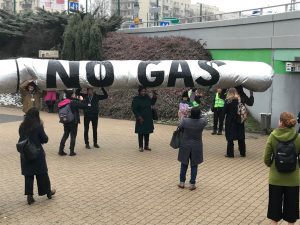Being from the US has brought a very interesting experience at COP24. Prior to arriving at the COP on Monday, the US, along with Kuwait, Saudi Arabia, and Russia refused to “welcome” the IPCC’s Special Report on 1.5 C and instead chose to “note” it during the Negotiations. The IPCC published its report in October of 2018 and explained the catastrophic impacts that would occur if the world does not limit the warming of the Earth to 1.5 C by 2100. Many Parties have been pushing for the Paris Agreement rulebook to provide substantive actions that will lead to a 1.5 C world rather than a 2 C world that was agreed upon in 2015 in the Paris Agreement. The United States publicly stated that the 1.5 C Special Report is a direct threat to its economic development because of the rapid timeline to reach a level of decarbonization in line with a 1.5 C world. As a result, the Special Report has brought greater division to the COP than unity.
On the day I arrived at the COP, the United States hosted a side event on supporting fossil fuel and nuclear under the guise of technological innovation. The US took a strong stance on the use of natural gas to reduce greenhouse gas emissions. At the same time, the World Wildlife Fund had a booth titled, “We Are Still In,” which messaged that despite the federal decision to pull out of the Paris Agreement, many actors in the US are taking action to reach the Paris Agreement goals. However, this message fell deaf to many because the of the tone the US set in the Negotiations. Many times, upon learning that I am from the US, COP participants asked what my position was on climate change especially given the US’ stance. I tried to explain that although the US plans to pull out of the Paris Agreement in 2020, there are many people, including subnational actors such as cities, states, and regions, hard at work addressing climate change issues. However, this concept did not register because that work is not reflected at the Negotiations, which is sadly true.

Protestors outside of the COP
An interesting connection to the tone set by the US, is the prominent role of coal and fossil fuel at COP24. COP24 is being hosted by Poland, whose energy sector is dominated by coal. According to the World Energy Council[1], Poland is the second-largest consumer of coal in Europe; coal accounts for 92 percent of electricity and 89 percent of heat in Poland and it will remain the key element of Poland’s energy security until 2030. To reduce greenhouse gas emissions, Poland is focusing on transportation via electromobility and single-family home efficiency via retrofits and renovations. The Polish Presidency has also been pushing for a “Just Transition” as it relates to SDG goals 13 and 8 (climate action and decent work and economic growth). It has defined “Just Transition” as shifting from carbon-intensive economies to low carbon economies by taking into consideration economic growth and job loss. Poland is concerned about the job losses that would result from moving away from a coal-based economy. There have been multiple sessions by different parties including the US on the feasibility of mitigating climate change by using fossil fuels efficiently. Countries throughout Southeast Asia and Africa have plans to construct coal-fired power plants in the next decade. Coal and fossil fuel have taken a more prominent role than I have expected at this COP.

Polish jewelry made of coal
An important lesson I have learned is that mitigation can take many different forms in terms of energy diversity. There are nations and organizations urging for complete decarbonization and a 100 percent renewable energy mix, others are opting for using nuclear plants to reduce emissions, and some believe that a diverse energy mix that includes fossil fuels is the best way to reach the Paris Agreement temperature goal. These decisions and views are dependent on many factors related to economic development, technological availability, and capacity and capability. The question that this leaves is, if the Paris Agreement is predicated on a temperature goal, how much does it matter the different ways that Nations decide to meet this obligation? Are there more desirable mechanisms that better protect our Earth, the climate, and it’s people, and should the rulebook dictate these mechanisms?
[1] https://www.worldenergy.org/data/resources/country/poland/coal/

UK presentation on the fate of coal